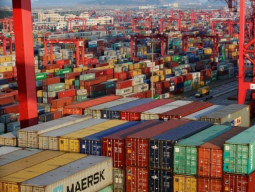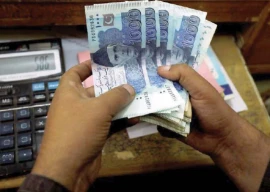
Robert Einhorn, the State Department's special adviser for nonproliferation and arms control, made his comments when he held talks with Deputy Foreign Minister Kim Jae-Shin.
"We are urging all of our partners to help us, to work with us in putting pressure on the government of Iran to get it to negotiate seriously," said Einhorn, who arrived Monday for a three-day visit.
"We are urging them to reduce their purchases of crude oil from Iran and to unwind their financial dealings with the central bank of Iran."
Einhorn, however, also pledged to be "very sensitive" to the economic needs of strong allies.
Highly industrialised South Korea, which imports all its crude, is a close ally of the United States and 28,500 US troops are based in the country.
But in the first 11 months of last year, it imported 9.6 per cent of its total crude needs from Iran.
As part of a drive to shut down Iran's suspected nuclear weapons programme, US President Barack Obama last month signed a bill that imposes tough sanctions against financial institutions dealing with Tehran's central bank.
South Korea currently deals with the central bank to make payments for its crude imports.
Einhorn is accompanied by Daniel Glaser, the US Treasury's deputy assistant secretary for terrorist financing and financial crimes.
Kim stressed South Korea's support for international efforts to resolve the nuclear issue but also highlighted fears of economic damage.
"In fact, many Koreans are quite worried about the sanctions against Iran at this time," he told reporters. "But I do hope we closely cooperate with each other and try to minimise this adverse effect."
COMMENTS (2)
Comments are moderated and generally will be posted if they are on-topic and not abusive.
For more information, please see our Comments FAQ












































The climax of the economic war against Iran is the oil embargo. Countries that buy from Iran are urged to join. In return Iran threatens to close the Strait of Hormuz. One way or the other, it will lead to a supply shortage in the short term. If supplies from Iran are not substituted from another source, it will result in higher oil prices which would create new problems for policymakers who have been trying to rein in inflation for the best part of 2011. The year 2012 sees government transition in China, elections in the U.S., France, Russia and many more countries. Economy is the issue that preoccupies the voters.
The shortfall in Iran's oil must be met by other oil producing nations without affecting the crude oil price and slow down in economy. Asia, and Europe imports Iran oil and the global response to US sanctions indicates that provisions have been made to offset the Iran oil.
In my opinion, Saudi Arabia has made up its mind against Iran, and is meeting the Iran oil shortfall with other OPEC?
Let us see what is the response of China, India, and Japan. India asked for waiver, China was not enthusiastic and Japan is wavering, and Europe is with US.
One thing is certain. The provisions to meet the shortfall in Iranian oil has been made and all the ducks are in row. It is only a matter of time for Iran to decide where she wants to go.